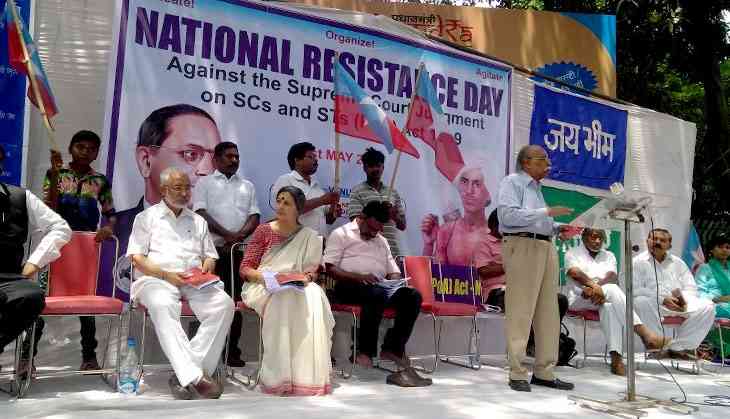Dalits, tribals turn 1 May into Resistance Day against dilution of SC/ST Act

On a day when the world celebrated Labour Day, Dalits and tribals along with Leftist leaders from across the country held demonstrations across India to make a powerful statement against the Supreme Court’s verdict that diluted Scheduled Castes and Scheduled Tribes (Prevention of Atrocities) Act.
A collective of more than 500 Dalit and Adivasi organisations collected under the banner of 'National Coalition for Strengthening Scheduled Castes and Scheduled Tribes Prevention of Atrocities Act' (NCSPA). They marked Tuesday as 'National Resistance Day', demanding that the Narendra Modi Government to either through Judicial or Parliamentary recourse, restore the status of the SC/ST Act as before the apex court’s 20 March judgment.
National Resistance Day was observed in over 70 cities across 22 states, where Dalits and tribals along with rights activists and left politicians flayed the apex court and the Modi-led government over the verdict and called for intensifying the movement against it.
This comes after the 2 April nationwide shutdown called by the organisation against the verdict.
Harping on the “abuse of the Act by vested interests”, an apex court Bench of Justices AK Goel and UU Lalit, in the verdict issued directions in effect diluting the provisions related to immediate arrest for offences under the Act.
Besides removing the mandate of immediate arrest under the Act, the Bench directed that arrest can be made only after preliminary inquiry and sanction by the competent authority. It also removed the “absolute bar” on an accused taking recourse to anticipatory bail.
Faced with growing outrage over the verdict, the Modi government filed a review petition before the SC urging the bench to reconsider its verdict. The apex court is slated to hear the review petition on 3 May. The NCSPA as also the Kerala Government too filed a petition seeking review/ recall of the 20 March judgment.
The NCSPA demonstration in the national capital saw the participation of several political leaders, including Communist Party of India's Rajya Sabha member D Raja, Communist Party of India (Marxist) leader Brinda Karat and Congress parliamentarian Pradeep Tamta.
Flaying the Modi government over the rising atrocities and crimes against Dalits, Raja dared the Centre to convene a special session of Parliament to discuss the issue and pass an ordinance to negate the verdict.
“The SC judgement has virtually made the SC/ST Act redundant. We wanted to raise the issue in Parliament, but the Prime minister and the Government was not willing to debate. So they did not allow Parliament to function. Modi is blaming the Opposition for Parliament not functioning, but it’s them who did not want to it to function,” Raja said.
“It’s being said the government is planning to move an ordinance to negate the judgment. If it is so, if the government is really sincere then why don’t they convene a special session of Parliament for this? But they will not do that, because this government is anti-Dalit this government is anti-worker,” said Raja referring to reports of the Centre planning to take the ordinance route.
Union minister and the National Democratic Alliance's Dalit face Ram Vilas Paswan has said the government will issue an ordinance to uphold the rights SCs and STs if the Supreme Court does not go back on its judgment.
Taking on the apex court, Karat said the judgment was a blow to social justice and strengthened the caste system.
“The SC used this case to strike a blow to the country’s social justice and the decades of struggles against the caste system. Lakhs of cases are pending before the Supreme Court for years, but in this case, magically the SC came out with verdict within few months of the petition being filed.
“It’s not just the SC but the government too played its part in this. The government preferred to remain a mute spectator and only filed the review petition only after faced with intense protests,” said Karat.
Spelling out the NCSPA’s charter of demands, National Convener VA Ramesh Nathan said the onus was on the Modi government to set things right.
“Rather than confining itself to the petition that was filed over caste discrimination, the SC went beyond and came out with a verdict which has diluted the PoA Act. It’s time for the Centre to act and ensure the law is restored like before. This can be done either through judicial process by revoking the judgment or through parliament by way of an ordinance,” he said.
Demands
The charter of demands by the NCSPA includes:
- Restoration of the SC/ST (PoA) Act to its original position either through Judicial or Parliamentary recourse.
- Inclusion of the SC/ST (PoA) Act in the Ninth Schedule so that it may get protection in matters of judicial review.
- Release of all Dalit and rights activists, leaders, community members and employees arrested on 2 April 'Bharat Bandh'.
- Robustly, enforce and implement the SC/ST (PoA) Act.
- Establish mandatory exclusive special courts in each district to deal with cases under the Act.
- Investigation and prosecution of Government and police officials negligent in their responsibilities in implementing the provisions of the Act.
- Conduct of open hearings by National Human Rights Commission and SC/ST Commission all over the country on cases of atrocities and on the implementation of SC/ST (PoA) Act.
- Constitution by Parliament of national-, state- and district-level enforcement authorities for effective implementation of the SC/ST (PoA) Act.

